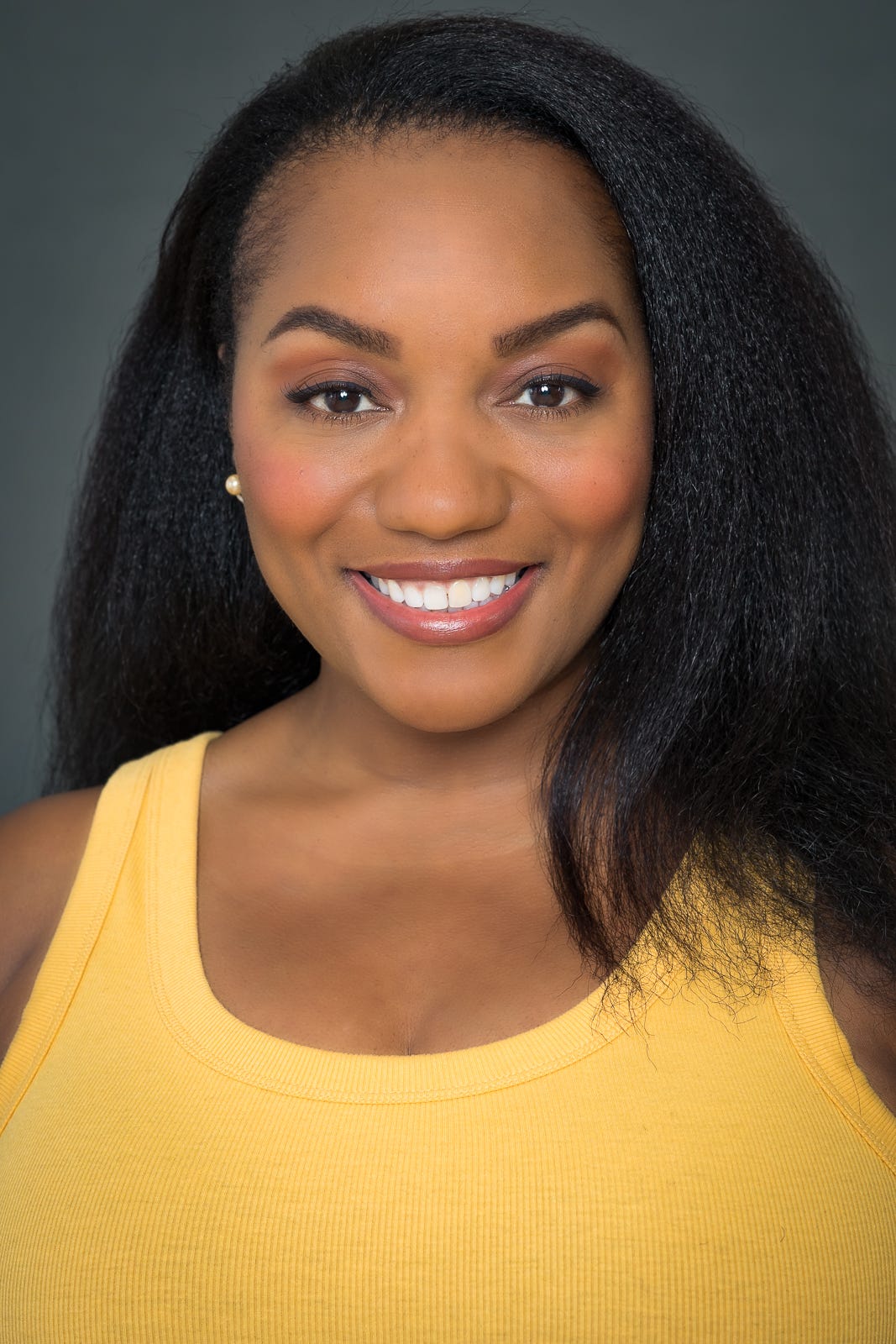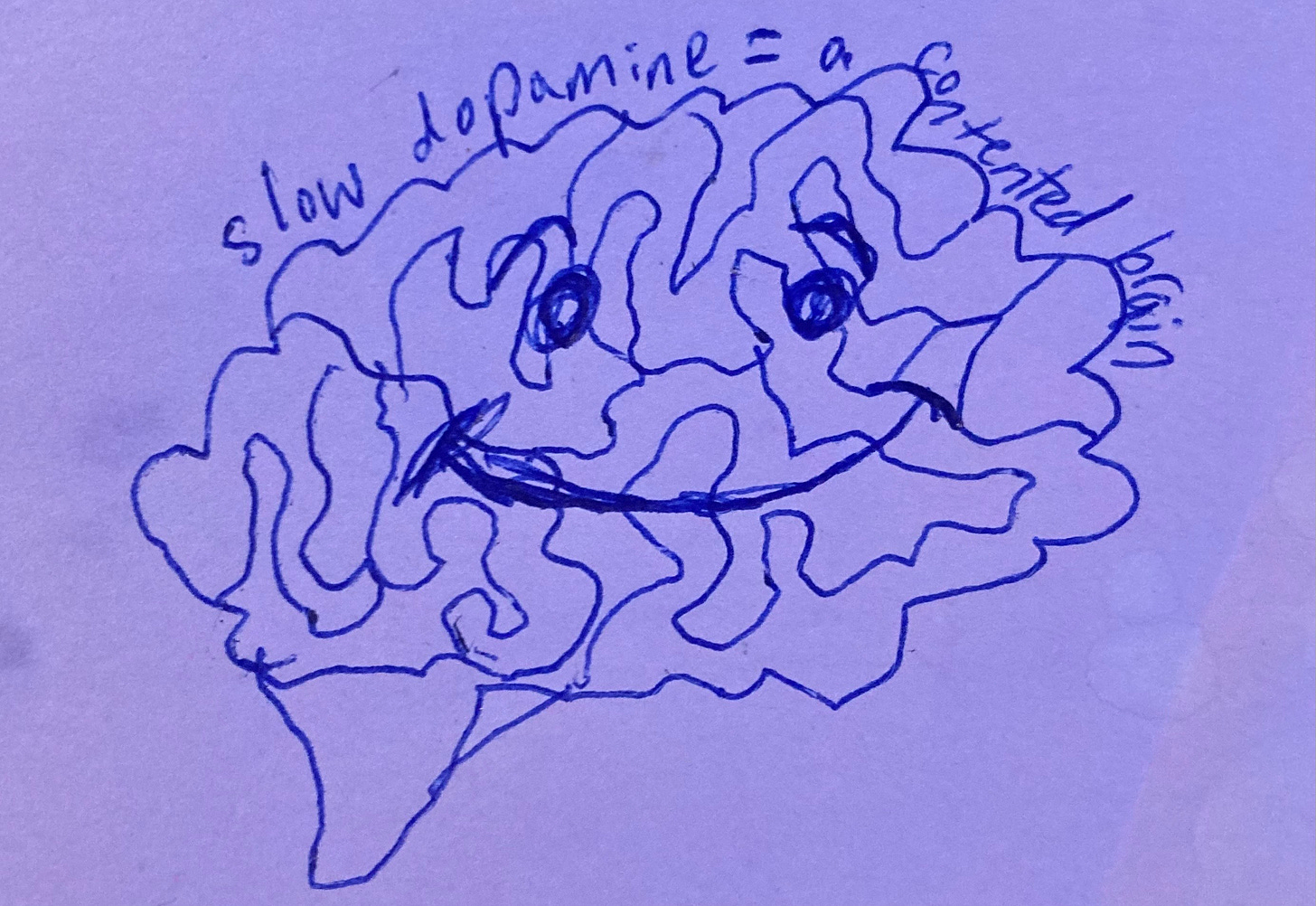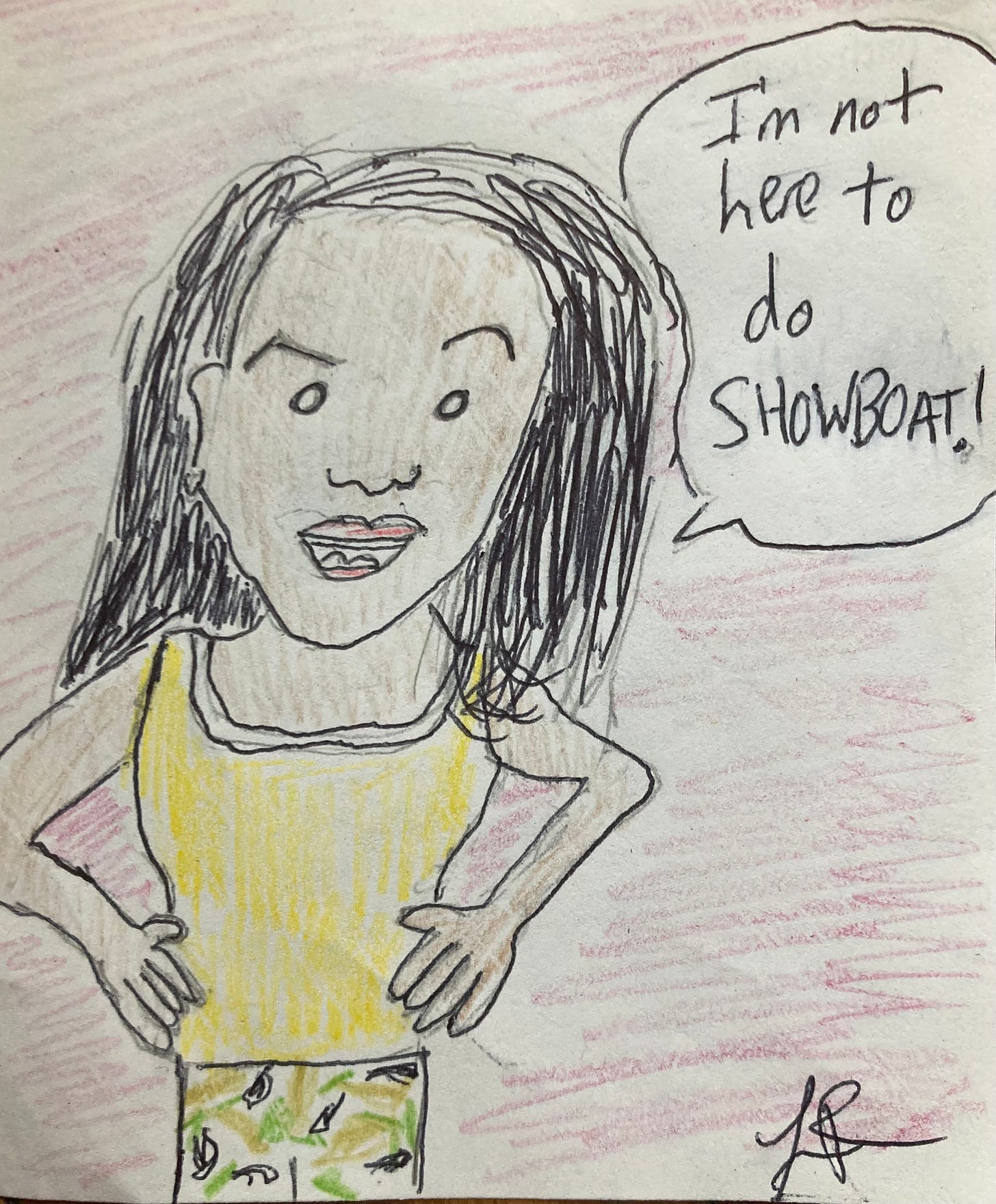MTiH #9: Badia Farha on the difficulty of paving the way.
“When you stay true to who you are, and what you bring, and you’re just steadfast in that, other people will catch up.”
Hello, friends. I am beyond delighted to share today’s interview with the incredible Badia Farha, an absolutely electric singer, performer, actor, and songwriter.
Badia’s had a prolific and varied career: on Broadway in Hell’s Kitchen (which she’s currently in) and School of Rock, Off-Broadway in shows including Broadway Bounty Hunter (which I co-wrote with Joe Iconis and Jason SweetTooth Williams), in numerous national tours and regional productions, and in the 2021 show she conceived and originated, From Ella to Amy, in which she pays homage, along with a 3 piece band, to female legends including Ella Fitzgerald, Billie Holiday, and Amy Winehouse. This is to say nothing of her accomplished music career writing and recording R&B soul albums as Lady Rose.
I met Badia two decades ago performing in Things to Ruin, a concert of Joe Iconis’s music, and she has been one of my favorite singers and people ever since. From the earliest stages of writing Broadway Bounty Hunter, Joe, SweetTooth, and I knew Badia would have to be a part of it. And, much to the show’s immense benefit, she was! From the very first reading in 2013, through the Barrington Stage production in 2016, to the Off-Broadway production in 2019.
This is Badia crushing the first number, “Woman of a Certain Age,” at an Iconis and Family concert at Feinstein’s/54 Below.
I loved doing this interview with Badia, in which she speaks about the intense difficulty of her experience going to grad school at NYU in the early 2000’s. We talked on Facetime. Our conversation has been condensed and edited for your enjoyment.
What brings you the most joy in your career as a performer of both theater and of your own music?
Being able to stand onstage and perform is pure joy for me. Being able to share my gifts—that’s what I call it, sharing—to share with the audience and connect with them and have it be a back-and-forth kind of communication thing, you know? Music has to touch you in a way that is very different; it’s an internal kind of celebration. So to tap into that, to tap into that for other people, and you have this vibration going on… It’s literally the best thing for me.
Especially when I’m doing From Ella to Amy, which is the show I wrote. When I get to do that show, it is purely me, because I get to do my own interpretations of the songs. I’m the head of the band, so the arrangements are how I want to hear it. I get to decide what I’m saying, what I’m delivering and how I want to communicate with the people responding to it. I absolutely adore that show and cannot wait to keep bringing it to people.
Are more shows scheduled for that?
I don’t have any more shows right now. I just did a show out in Springfield, Massachusetts at “52 Sumner” the end of February. It turned out so good. More than they expected. They were not expecting my show to be like that. They put me on the front page of their local paper. It felt so good.
Okay, amazing, so that’s all the joyful stuff. But this interview series is called Making Things is Hard because I think it’s so comforting for people to hear about other artists, when they’ve struggled. Do you have a specific creative struggle you want to talk about?
I have a ton of creative struggles.
Well, yeah. [We laugh.] Me too.
It’s like, “Pick one.” Because this industry is not for the faint of heart.
It’s very difficult because it’s solely based off of people’s opinions. It’s very hard to deal with people and their opinions of you! And it affects how you feel about yourself. You really have to work on yourself to be so strong and firm in who you are, and what you represent. To not let that permeate into…destruction.
Yes! When this art is what you do, and it’s who you are, and then other people are like, “Meh”…
You know, you work so hard for an audition, and you go in. And you’re off-book! You’re doing all the things, and they don’t say anything. They’re like, “Thank you.” You’re saying to yourself, “Are you fucking kidding me?”
YES. You put your heart and soul into it, but maybe they already saw the perfect person an hour ago, and you don’t even have a shot, and it’s like, Okay. My heart and soul were put out there for no reason.
Exactly. And every audition we go on is our job, you know? You’re like, “This could be the one!” And then when it doesn’t happen, we’re deflated.
But I can say one thing that is specific to my story is…NYU.
NYU was very difficult for me.
Because when I went there, it was very…white conservative.
And I was one of maybe, I don’t know, eight people accepted into the Steinhardt graduate program. There were two Black people. Me. And a guy named Reginald Houze. Who, to this day, we are still great friends.
I came in with all of my urban, Black sensibilities, into this program that was very conservative musical theater. White. They had a really hard time with the way that I sang, with what they perceived musical theater voices should be. Which is very, you know, legit, soprano, high. And my voice is deep, just talking. A very warm, grounded kind of sound that I think they were like, “What. In the world. Is this? And what are we gonna do with her?”
But you auditioned and got in…
I auditioned, and I did get in, and they told me— They said, “Listen, you’re gonna have to do a lot of work because this program, blah blah blah,” and I said, “Listen, that’s why I’m in school. I’m in school to learn.” So, great!
Also, I didn’t realize it was a musical theater program. I’d been performing all my life. I thought I was in a program for just singing, dancing, and acting. No. I was not aware that there was an actual thing called musical theater that encompassed all that. So I’m also walking in blind.
Between me and the program, it began as a clash of urban, R&B performing with standard, conservative musical theater.
Did you ever try to drink their Kool-Aid and think, “Yeah, I’ll try and mold myself into something I’m not”?
Well, yeah, I did. Because I also realized that there’s… Okay, I fought it at first. I was like, “This is me! I was accepted, and I’m coming in, and you’re supposed to mold to who I am!” Then I did my first recital and got an F.
Ohmigod.
Not even a D for trying. It was like fail, fail, fail, fail, fail. And they made me do a second recital of all legit music.
At this time were you kind of identifying the racist roots of this? Or seeing this as racism? Or did you just feel like, “I’m not good”?
No, I was definitely seeing it as partly racist. Because they would give me songs to learn, and they would give me stuff from Showboat. I was like, “I’m not here to do Showboat!” What are we talking about? They’re saying to me, “We don’t understand. This is a show you could do, though. This is the show you’d be auditioning for!”
And I’m saying, “But I’m in school, and I’m paying, so I don’t wanna do that…”
They just didn’t know what to do with me. I also didn’t understand where I was.
I think as time went on I realized that, Listen, you’re in school, you’re here to learn something. Stretch yourself. And with that second recital, I had to do about eight legit songs. I did them successfully. After all that, they refused to give me an A. They gave me a B.
I got a B, and then I said to myself, “Okay, let me start working on different parts of my voice.” And that’s a good thing that I got from my first year. I started to learn and put away my ego and open up my mind to different experiences and different parts of my voice.
So it sounds like the end result was something you could learn from, but the professor, instead of giving you an F, could have been like, “Look, we love what you do. We want you to try and expand and see if you can diversify what you do, though, to make you a more versatile performer.”
They didn’t do that. I was not a student they had ever had before. People come into the program, and they already know what this is. And I was a person that came in, you know— When I auditioned, I had on fatigues, you know what I mean? I’m this urban girl who’s like… I’m in the program at NYU!
My aunt told me I could do anything, so I believed, “I can get in. I can audition and get in.” When I got in, I was like, you know, dustin’ dirt off my shoulders. Thinking I was all that. And they were like, “No. You’re not as good as you think you are.”
“You’re in, but we don’t really want you.”
No. So I started to learn and open myself up to different experiences, lessons. After I got the B, they decided, “Let’s try something different” and “We’re gonna start from scratch.” They fired everybody I worked with before and was like, “You need a whole new everybody.” My voice teacher. My accompanist. Everybody. They said, “All of them have got to go. We’re going to start from scratch. Everything is changing for you.”
And that’s when Joe Iconis entered my life.
I was gonna ask when this intersected with Joe!
That’s when he entered my life. He was a person that wasn’t very traditional musical theater either. And I think they were like, “You guys would be such a great fit.”
Ah, that’s cool, the professors paired you up?
Well, they gave me a list of people and said, This person is this, this person is that, and I picked Joe off that list, being also just not the typical…
The misfits.
Right! The misfits.
Yeah. Which I feel like all of Joe’s people—including me—are drawn to each other ‘cause we don’t quite fit into this larger idea of what musical theater is or wants.
Exactly.
Did you and Joe hit it off instantly?
Oh yeah. Absolutely. Like instantly. And from working with new people—new voice teacher, all these people—it started to come together a little bit more for me.
So it was partly that both of us—me and NYU—had to come to an understanding of what this was going to be.
By the time you were leaving, did you feel better in your relationship to NYU? Did it feel like it was worth it?
It does. It feels like it was worth it because of the connections I made. And it did open me up to something I never knew existed. Musical Theater.
Yeah. That’s cool.
Also, me being there paved the way for them to start looking at Black performers and Black students very differently.
Right. It sounds like you really did pave the way. They had not seen a performer like you, so you were pushing that door open. And it sucked. But also…
Right. After me, I started seeing them start to give different parts to Black women and Black students. Working with students on a belt because back then, they could not…did not. They were like, “Who belts? No one does that! Why? No!”
Cut to twenty years later, that’s probably the first thing they teach.
[We laugh.] Exactly! So I think it was eye-opening for both of us.
Someone I know went to the program years after I left, and after the recital, I saw one of my professors. He was never really my professor, let me say that. He was a well-known professor and very, very tough. Strict. He left me no slack.
I saw him at the recital, and he walked up to me, and apologized.
Wow.
He said, “I have to say that you were treated terribly, and I want to apologize for what I’ve done, what the school put you through…”
How did you feel?
I felt like a weight was lifted off me. I felt…I don’t want to say vindicated, but the word is… When you stay true to who you are, and what you bring, and you’re just steadfast in that, other people will catch up.
Yeah. Well, that’s painful and beautiful. What do you think happened in the time since he’d seen you to realize he’d messed up?
I think just accepting other Black people in the program, and looking at who they are and what they bring and not what you want to put on them. Not just, This is what it should be. These are the roles that you should be playing. Actually looking at them and being like, “You know what? They have this great quality to their voice. Let’s explore that. Let’s give them a part that they probably never would have played before or been cast in. Because we’re a school! We can do that.”
It's a time to learn! We’re not trying to generate box office revenues.
Exactly. There are no producers that are trying to make their money back.
I’ve done a number of these interviews now, but no one’s talked about this formative time of going to school. That story’s so moving. You were a trailblazer, and that’s really hard to do.
It’s very hard to do. It was very difficult.
So lonely.
It was. A very hard two years. It was very difficult.
I’m sorry.
But it’s funny because Reggie— I saw him a month ago, maybe two. And we went out to dinner. He did a live Instagram, and I popped up and I was like, “Hey, Reggie.”
Is he in the business still?
He kind of is. But he has this really great Instagram channel—he’s a sommelier now—so he talks about all these wines, and different things. He has this very polished look, and he’s an entertainer, so it’s very funny. So I popped up on his sommelier channel, and I was sitting in my dressing room. He was like, “Ohmigod, you guys. Let me tell you something about Badia. When she walked into NYU, they looked at her like she had six heads. And now she is one of the most accomplished people from our program.”
Hell yeah. It’s so meaningful. And I’m sure he was a big part of getting you through that experience because he could at least confirm you’re not crazy. “Are they treating me really shitty?” “Yeah.”
“Yeah, they treated you terribly.”
Did he have as hard a time?
No.
Interesting. Because his voice just fit more of the legit mold?
Yeah. And I think he also came in knowing theater, loving theater. And I was just, you know…not that. But what he said was great confirmation too. He was like, “They should be ashamed of themselves.”
Yeah. They should. And they are! They told you they are. One of them, anyway.
Yeah, I’m definitely growing. And I do think that my career has lasted this long because I love what I do, my fortitude, and my go-get-em nature. But also the things that I learned at NYU are invaluable. I allowed myself to stretch and learn something different, get out of my own way.
Well, thank you for sharing that. I always end with a question which I think you’ve already answered, but it’s: what would you go back and tell your younger self if you could tell them something now, having experienced the career you have? But I think you’ve already dropped so much wisdom. So feel free to say, “It’s what I already said.”
Hmmm. I think I would tell my younger self to not be afraid and seize opportunities more. Because I didn’t come into musical theater knowing it at all, I would talk myself out of things, or just not be—
You know, I see these kids now who are right out of school and they’re in their 20’s, and they’re so confident, so sure, and they come out and book these gigs. I did book a lot. I constantly stayed busy. But I think I would have been at a different level than I am now if I had just seized the opportunities a little bit more. Believed in myself more and put that forward. Just seize the moments a little bit more. Grab and hold onto them and show up for yourself.
Thanks so much to Badia for this honest and beautiful conversation. Check out Badia’s music, and if you have the chance to see her perform anywhere, YOU MUST GO.
Hope you’re doing all right as summer gets started. And hope you’re still finding ways to assert your humanity during this unpleasant time—calling reps, protesting, making art, talking to friends on the phone, reading books, spending money locally whenever possible.
Much love! Watch The Studio and this season of Hacks. They’re both superb. Oh, and GO KNICKS.






Wow, such a statement interview that directly captures the theme of Slow Dopamine. Having seen Badia perform many times, she ALWAYS brings it. But hearing her backstory makes her performances even more meaningful. She is one of those “Instant Success” stories that in reality spans decades of failure, setbacks, and intermittent successes while overcoming the minuscule odds of sustaining a lengthy career in show business.
wow!! so glad this interview exists!!